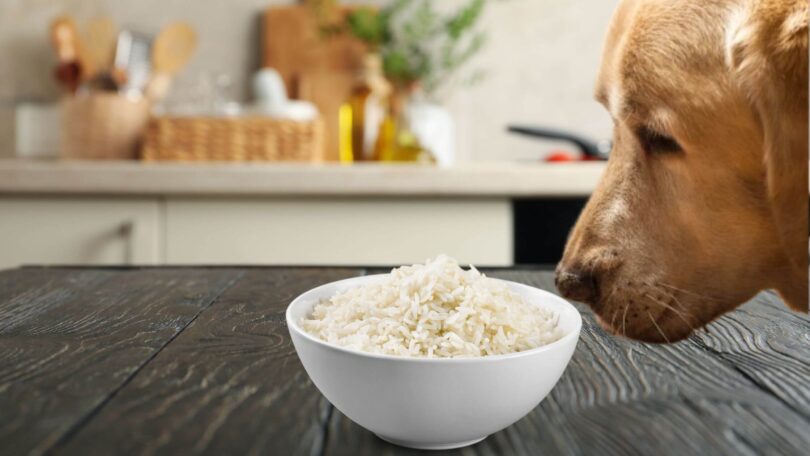As pet parents, we’re always worried about what our pets eat, right? Taking care of our pets’ health and well-being is something every pet owner talks about. In the past, it was super common to feed them table scraps, but nowadays, that’s changed a lot. So, is it actually safe to share our food with our dogs? Is there a safe way to do this? One question that often comes up is: can dogs eat rice?
In this article, we’ll cover the benefits of rice in a dog’s diet, the different types of rice, and which ones are best for them. Keep reading to find out if feeding your dog rice is a good idea.
Rice as a dog food option
Rice is a staple in many cultures worldwide because it’s versatile, easy to make, and packed with carbs. That’s why so many pet owners consider adding it to their furry friends’ diets. But is rice actually good and safe for dogs?
We know dogs are omnivores, but their diet should be mainly focused on high-quality proteins and fats, with carbs playing a smaller role. So, yes, dogs can eat rice—it can be a healthy addition if it’s given in moderation. Rice is especially helpful when a dog has an upset stomach or is recovering from an illness since it’s gentle and easy to digest.

Types of rice
In the U.S., the most popular kinds of rice people eat are white, parboiled, and brown rice. You might’ve even spotted ‘dog rice’ for sale at pet stores! Here’s a quick look at each type:
- White Rice: The type we eat most often, and it’s the easiest for dogs to digest. White rice goes through a refining process that removes the bran and germ, lowering its nutritional value but making it gentler on the stomach. It’s often recommended for dogs with digestive issues or who are recovering from an illness.
- Parboiled Rice: This rice is partially cooked with its husk on before processing, which helps it retain more nutrients than white rice while still being easier on a dog’s digestion.
- Brown Rice: Brown rice is more nutrient-rich, packed with fiber, vitamins, and minerals that improve digestion for us humans! But for dogs, it can be harder to digest, especially for those with sensitive stomachs or digestive issues.

Benefits of rice in a dog’s diet
As mentioned, rice can be a great option for dogs with digestive issues, especially white rice. Here are a few more benefits:
- Energy Source: Rice is an excellent source of carbs, giving dogs a quick energy boost that lasts throughout the day thanks to its complex carbs that release energy gradually—great for active pups!
- Low in Fat: Rice is naturally low in fat, making it a good choice for overweight dogs. Paired with lean protein and veggies, rice can be part of a balanced and healthy meal.
- Digestive Support: White rice is especially good for dogs recovering from diarrhea, thanks to its starch content, which helps firm up stools without overloading their digestion.
- Fiber and Vitamins: Brown rice has more fiber, B vitamins, and minerals, which are great for a dog’s bones and metabolism. However, its high fiber content can be tough on sensitive stomachs, so it’s not ideal for dogs with digestive or pancreatic issues. Vets often recommend a mix of cooked white rice and chicken as a recovery diet for dogs with temporary stomach problems.

Recommended amounts of rice
It’s essential to be mindful of how much rice you’re feeding your dog. Too much can cause weight gain or nutritional imbalances, especially in less active dogs. Here are some general guidelines:
- Small dogs: 1 to 2 tablespoons of rice per meal
- Medium dogs: Up to ¼ cup of rice per meal
- Large dogs: Up to ½ cup of rice per meal, depending on their calorie needs and activity level
Remember, rice shouldn’t be the only part of your dog’s diet or served daily unless your vet recommends it as a temporary solution.
Risks and warnings
Now that we know rice can be beneficial, here are some situations where it may be better to avoid it:
- Obesity and Diabetes: Due to rice’s high carb content, it’s best to limit rice for dogs prone to obesity or diabetes.
- Food Allergies: Though rare, some dogs may be allergic to rice. When introducing it to your dog’s diet, keep an eye on them for any signs of an allergic reaction, such as diarrhea, skin irritation, or itching.
No matter what type of rice, avoid seasoning or adding salt, and keep it simple—just plain, cooked rice as a small supplement to their diet.

Final takeaway
So, can dogs eat rice? Yes, as long as it’s in moderation and balanced with other nutrients. Rice can be a quick energy source, help with digestive issues (especially white rice), and be part of a light, healthy diet if you’re a fan of natural food options for dogs.
Just remember that rice alone doesn’t provide a complete diet. Dogs need a well-rounded mix of proteins, nutrients, and healthy fats. By giving your dog a balanced diet, you’re making sure they stay healthy and full of energy for the long run!







